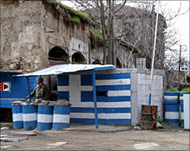Bomb blast ahead of Cypriot talks
Just hours before Cyprus reunification talks were scheduled to begin on Thursday, a small bomb exploded in front of the home of the prime minister of the self-declared Turkish Cypriot state. There were no injuries.

Turkish Cypriot Prime Minister Mehmet Ali Talat, a leading advocate of reunification, quickly vowed that the talks would go on.
The blast in front of his home shattered windows and tore apart tree branches and street signs.
Greek Cypriot President Tassos Papadopoulos will meet with Turkish Cypriot leader Rauf Denktash and Talat at an abandoned airport on the sides’ border later on Thursday for an intense round of UN-sponsored peace talks.
Aimed at ending the island’s division, the round of talks is being met with unprecedented optimism on both sides.
“There is no return from this road,” Talat told reporters in front of his home after the early morning blast. “In this process, there may be some people who are disturbed by the two communities coming closer, but such acts will not make us return from this path.”
There have been fears in Cyprus that extremists could use violence to try and disrupt the talks.
EU membership
For decades, negotiations have failed, but the two sides now face a firm deadline. Cyprus enters the European Union on 1 May as a united country or as a divided land with UN peacekeepers patrolling in its capital.
 |
|
The disputed island of Cyprus is to |
The US and the EU are closely watching the talks and are putting pressure on Turkey and Greece to press for a settlement before Cyprus’ entry into the EU.
For Turkey, Cyprus’ entry as a split country could be a disaster for its own EU bid. Turkey has 40,000 troops on the north of the island and EU leaders have made it clear that those soldiers could be considered as occupying EU territory after 1 May.
In an address to parliament, Turkish Foreign Minister Abd Allah Gul spoke of the possibility that without a solution, some EU officials who visit aspiring member Turkey in the future could be from Cyprus.
Solution
For EU and Greek Cypriot leaders, the division raises the possibility of an EU member that controls only two-thirds of its territory. EU laws would only apply in the internationally recognised Greek Cypriot side of the island if Cyprus enters the EU divided.
 |
|
A Greek-Cypriot soldier mans his |
“We are now closer than ever to finding a solution,” EU Expansion Commissioner Guenter Verheugen said earlier this week. Verheugen arrived in Cyprus on Wednesday to stress the EU’s interest in a settlement.
US President George Bush pressed the need for a solution in his January talks with Turkish Prime Minister Recep Tayyip Erdogan.
The negotiations will open at Nicosia’s airport, which was abandoned after the island was divided in 1974 following a Turkish invasion after a short-lived coup by supporters of union with Greece. The airport is now used by UN peacekeepers.
Last round of talks
The last round of talks collapsed in April, amid Denktash’s objections.
Denktash has long said that uniting the Turkish Cypriot north with the Greek Cypriot south would lead to Greek Cypriot
 |
|
Turkish Cypriot leader Rauf |
domination. The south, with a population of 600,000, has three times as many people as the north and about five times the per capita income.
But the EU accession has become increasingly popular in northern Cyprus and a quick look at the divided city shows why.
The popularity of the EU has put intense pressure on Denktash, especially after fellow hard-liners lost control of parliament for the first time in January elections.
At the same time, Denktash faces pressure from Turkey.
Strict timetable
The new talks will face a strict timetable devised by UN Secretary-General Kofi Annan.
The leaders have five weeks to work out an agreement using a plan written by Annan as their basis.
|
“The hard task is only beginning” Abd Allah Gul |
If they fail, Greece and Turkish leaders will enter the talks. And if that fails, Annan has the right to fill in the blanks and put the agreement to a referendum on each side of the island on 21 April.
The plan calls for a single state with Greek and Turkish Cypriot federal regions linked through a weak central government.
But many details of the plan, such as how many Turkish troops would remain on the island and how many refugees could return to their homes, are sharply contested.
“The hard task is only beginning,” Gul told parliament.